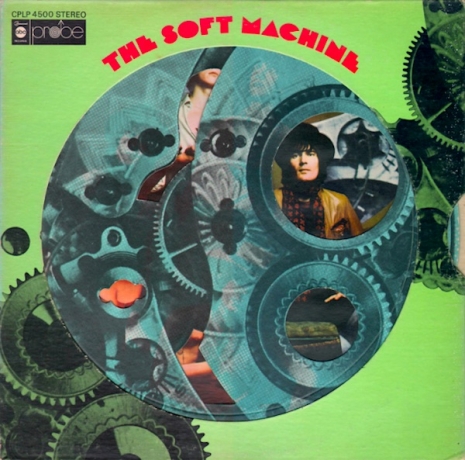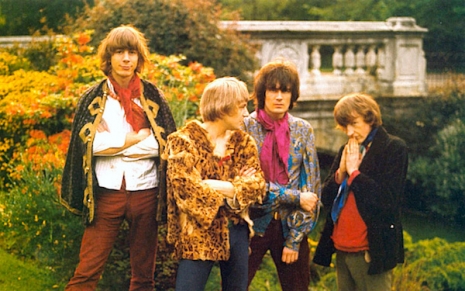
The Soft Machine line-up was always kinda fluid but didn’t fully set until Kevin Ayers (bass, vocals) joined Robert Wyatt (drums, vocals), Daevid Allen (guitar), and Mike Ratledge (organ) sometime in the summer of 1966. Wyatt and Allen had played together in the Daevid Allen Trio in 1963, before Wyatt, Ayers, Ratledge and Hugh Hopper formed the Wilde Flowers which would later include members of Caravan.
The Soft Machine (always the Soft Machine until 1970) took their name from the book by William Burroughs. Allen had stayed at the “Beat Hotel” in Paris when Burroughs, Ginsberg, Gysin, and co. were in residency. He had been “the friendly straight with those guys.” He took drugs, made music (composing the soundtrack for a short film version of Burroughs’ novel The Ticket That Exploded), and soaked up the free-wheeling bohemian lifestyle. By the time he hooked-up with Wyatt, Ratledge and Ayers, Allen was a seasoned musician, poet, beatnik, and proto-hippie traveler.
Ayers arrived in England from Malaya at the age of twelve to attend “any school that would have me.” This turned out to be a high school in Canterbury called the Simon Langton Grammar, where he met Wyatt and Ratledge. Wyatt was into a range of music from jazz to classical, while Ratledge starting to experiment with tape loops. This potent mix of music and experimentation found its full expression in the Soft Machine.

The Soft Machine as a four-piece with Daevid Allen.
The band moved through various lineups before settling on the foursome of Allen, Ayers, Wyatt, and Ratledge. The band were resident at the legendary underground club UFO alongside house band Pink Floyd. There was a rivalry between the two until the Floyd trumped their opposition with the pop single “Arnold Layne.” The Softs were never as commercial (though they did release what is arguably the first psychedelic single “Love Makes Sweet Music” in February 1967) as they preferred live improvisation and experimental sounds. Theirs was truly the music of the underground and a sound that would see them rightly hailed as “one of the more influential bands of their era, and certainly one of the most influential underground ones.”
According to Allen, the Softs first gig as a quartet was at the launch party for IT (the International Times) which quickly turned into a happening when Yoko Ono joined the band on stage and encouraged the audience “to touch each other in the dark.” A motorcycle was brought onto the stage and a microphone placed against the cylinder for “a good noise.” According to IT publisher Barry Miles in his memoir In the Sixties:
They also gave young women rides around the outer rim [of the venue] the Roundhouse on [the bike], bumping through the dirt and debris, raising clouds of dust.
The Softs were under Chas Chandler’s management, ex-bass player with the Animals who was also manager to Jimi Hendrix. Through Chandler, the Softs toured Europe and as support to Hendrix in America. However, after a tour of France, Allen was refused re-entry into England as he had an Australian passport and no visa. Allen quit the band, returned to Paris and set about forming the prog rock Gong. After recording and releasing their brilliant and seminal eponymous-titled debut album in 1968, Ayers quit the band to pursue a solo career. That was almost the end of the Softs, but due to contractual reasons Wyatt, Ratledge and Hugh Hopper reformed the band to release Volume Two in 1969. Since then, Soft Machine has continued under different line-ups (though lacking its original members) right up to the present day.
In October 1967, Ayers, Wyatt, and Ratledge were filmed performing “A Certain Kind,” “Save Yourself,” “Priscilla,” “Lullabye Letter,” and “Hope For Happiness” for the French TV show Ce Soir On Danse, which was broadcast in August 1968.